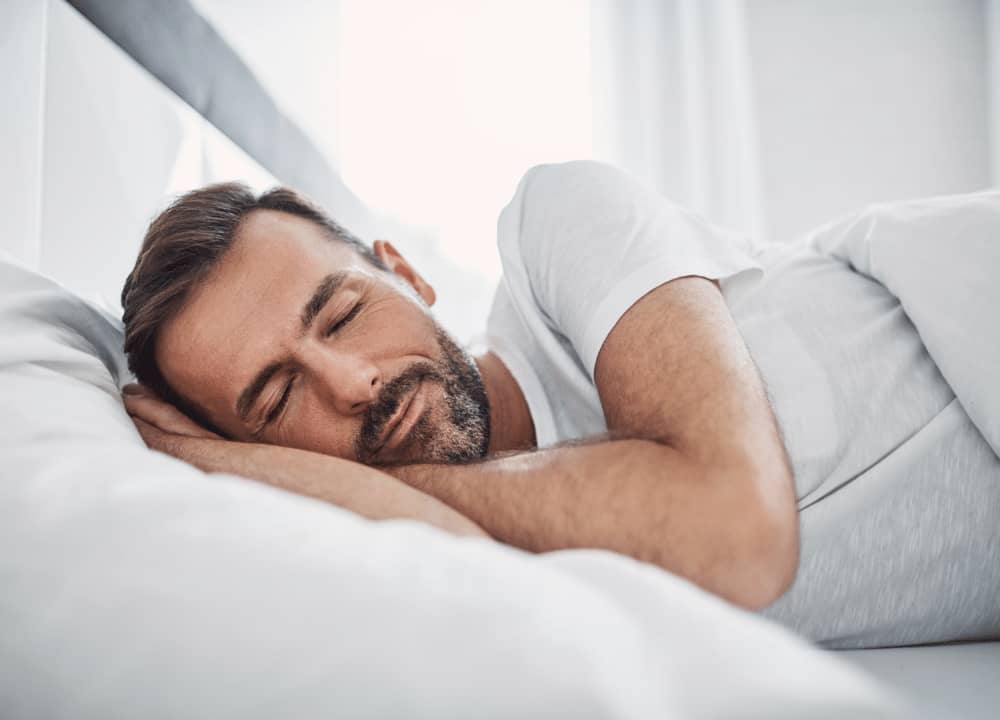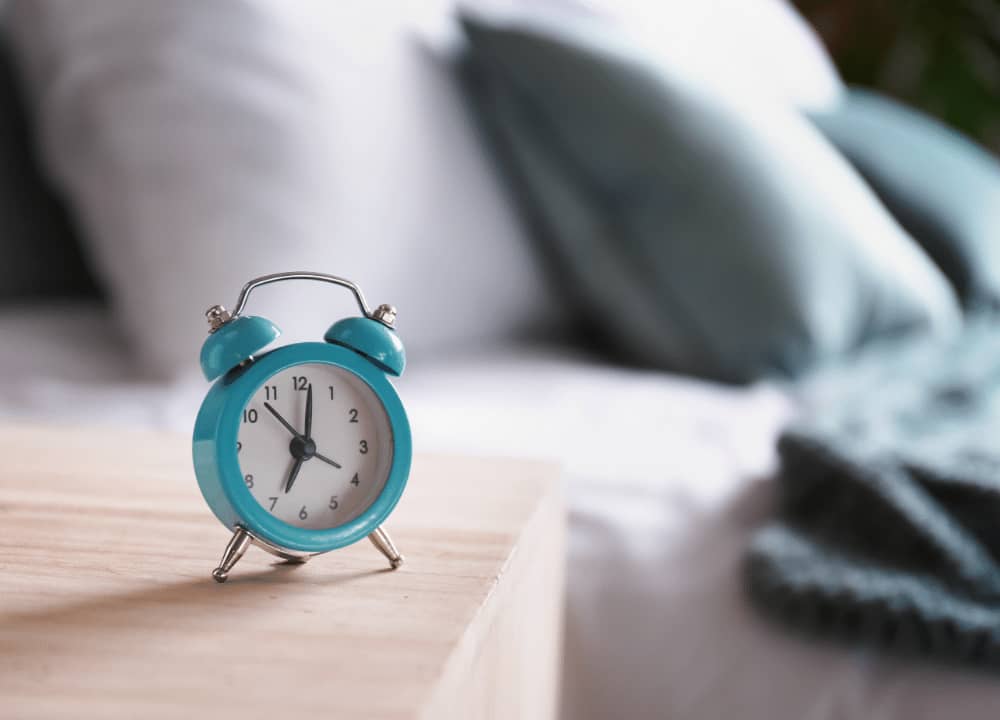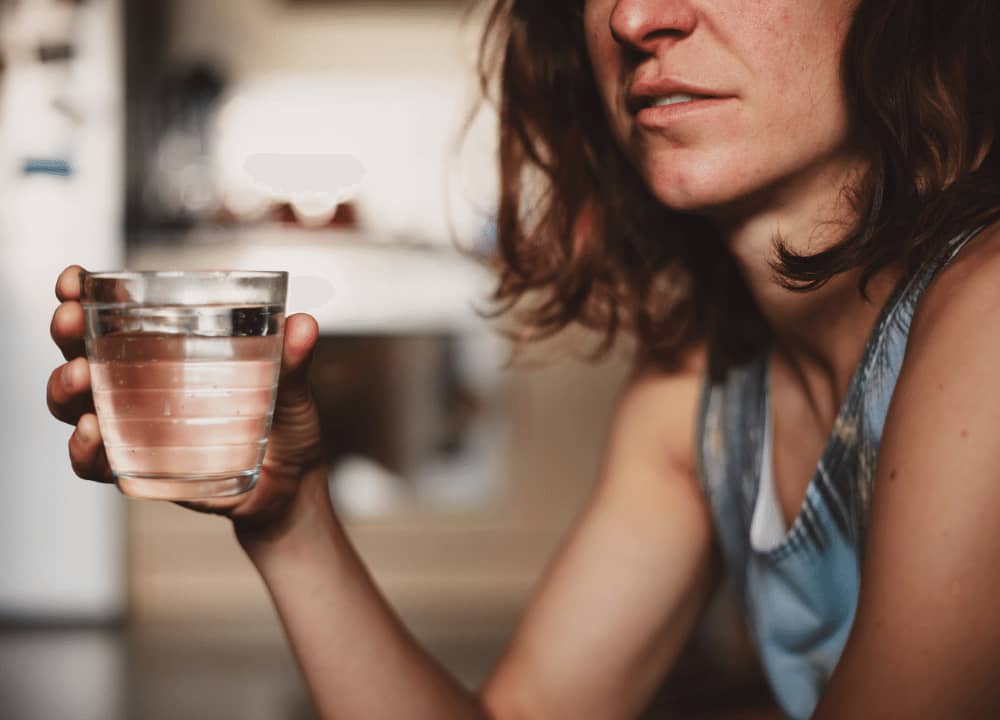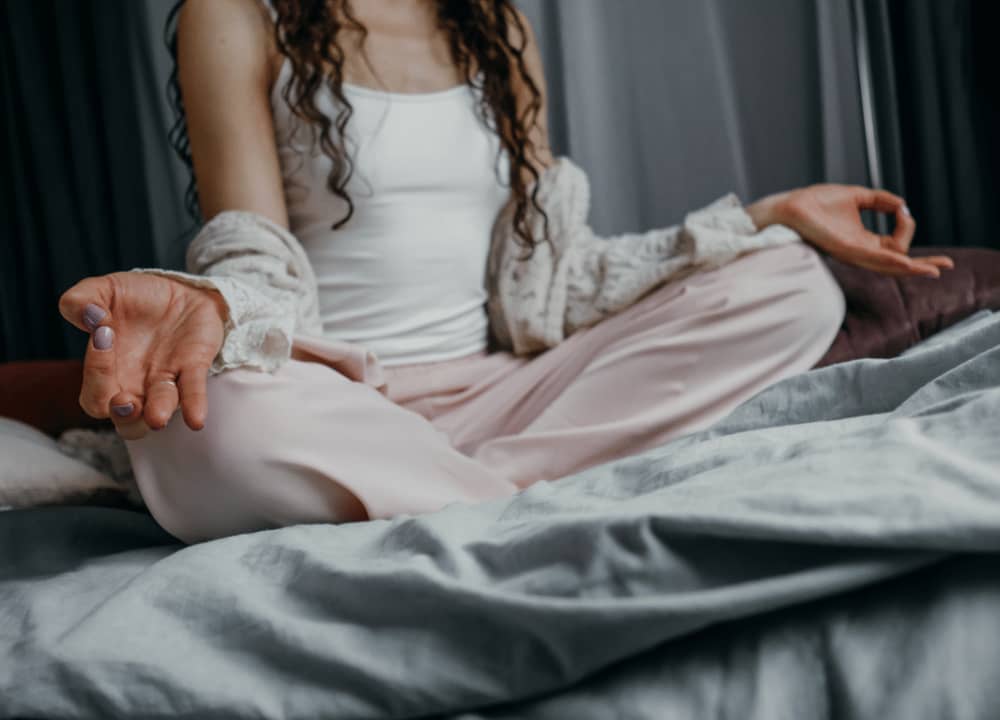How To Get More Deep Sleep: The Secret Way To Ensure Quality Rest
Have you ever woken up from a long night of sleep without feeling well-rested? Maybe it’s difficult for you to get quality rest, but what exactly is “quality rest” in the first place? If you fall into either of these groups, you may have been told to get more deep sleep, but this term can also confuse people. Some of us are unaware of the different phases of sleep, and in fact, one of the most important phases is deep sleep.
If you’re wondering how to get better rest this guide will answer all your questions. So get comfy and let’s learn how to get more deep sleep!
Why Is Sleeping Important?
Getting proper amounts of sleep every night is crucial for brain health, alertness, and your body’s overall wellbeing. Sleep boosts the immune system, helps prevent weight gain, revitalizes the body, and strengthens the heart. A good night of rest also improves mood, productivity, athletic performance, and memory.
These health-boosting effects are magnified by the amount of deep sleep we get. So, how does sleep help us reap all these benefits? When we go to sleep, our bodies produce Human Growth Hormones (HGH).
These growth hormones help us grow during childhood. As adults, HGH is produced to maintain and repair the muscles, fibers, and tissues throughout our bodies. However, we produce less of this growth hormone when we don’t get enough sleep.
What Are the Stages of Sleep?
For those unaware, there are actually four sleep stages, and each phase has its own benefits for the brain and body. The four sleep stages are transitional, light sleep, deep sleep, and rapid eye movement (REM) sleep. As we sleep each night, the body goes through these four stages several times.
According to the sleep foundation, the first stage of sleep lasts about five minutes. The second stage can range from 10 minutes to an hour. The third stage typically lasts between 20 and 40 minutes, while the final stage can be 10 minutes to an hour.
This sleep cycle allows our bodies to benefit from each phase before moving on to the next one. If you only get a few hours of rest per night, your body won’t get the full benefits from all of the other stages.
Fitting in a few power naps throughout the day is helpful, but only results in transitional and light sleep. Since each sleep stage can take varying amounts of time, a quick nap might not get you enough of a particular sleep phase. Naps should be secondary to full sleep cycles every night.
Non-REM
The first three stages of the sleep cycle are non-rapid eye movement (non-REM) sleep. In these stages, our brain activity is lower than when we’re in REM sleep.
- Transitional Phase: The first sleep stage is the transitional phase, and it occurs moments before unconsciousness when we are falling asleep and drifting in and out of consciousness.
- Light Sleep: The second stage of sleep is light sleep. During this phase, the heart rate slows, the body temperature drops, and muscles relax.
- Moderate and Deep Sleep (Slow-Wave): The third phase, deep sleep, is the hardest stage to wake up from. The third sleep stage was previously broken into two separate phases, known as moderate sleep and deep sleep. However, both are slow-wave sleep stages and were changed to a single phase. Slow-wave sleep is the deepest rest your body will experience throughout the night. This phase is also the most restorative period of sleep time.
REM
Rapid eye movement sleep is the final stage of the sleep cycle. REM sleep is characterized by rapid eye movements, even though our eyelids are closed. This motion signals a higher level of brain activity, and experts believe REM is the stage of sleep during which we dream.
Non-REM sleep heals the body while the mind rests, and REM sleep exercises the brain while the body rests. We experience more REM sleep as children, with children experiencing 30% more of this phase than adults.
When we wake up naturally, we come out of REM sleep. This is why naturally waking up is so soothing, while being woken up in the middle of deep sleep can cause grogginess or disorientation. After the REM stage, the body will either repeat the sleep cycle or increase our body temperature and wake us up.
What Are the Benefits of Deep Sleep?
Sleep repairs and fortifies the body, but deep sleep has even more impressive benefits. During the third stage of sleep, our brain waves slow to delta waves. This is why deep sleep is also referred to as slow-wave sleep. Delta waves are slow enough to give our busy minds a break for a while. Our brains take up many of our internal resources, so this rest period lets our bodies be the center of attention. This period of bodily repair and maintenance is why we often don’t feel sore until the day after a workout.
Other benefits of deep sleep include:
- Cell regeneration
- Increased blood supply to muscles
- Stronger immune system
- Energy restoration
- Tissue and bone growth/repair
What Happens if You Don’t Get Enough Sleep?
Sleep deprivation can disrupt our circadian rhythm, which is the body’s natural sleep and wake cycle. A night without adequate deep sleep can leave us feeling tired throughout the day. This causes an inverse sleep schedule, which makes you feel tired during the day and energized at night.
Disruptive deep sleep inhibits the growth hormones our body releases during slow-wave sleep. These hormones can affect our appetite, and a poor night’s slumber can cause excessive hunger the following day. Not getting the right amount of sleep can also result in decreased blood flow.
How to Get More Deep Sleep
Even if you get 9 hours of slumber every night, you may still wake up feeling the symptoms of a restless night. A good nightly routine depends on sleep quality just as much as it depends on total sleep time. If you don’t get much deep sleep, it might not feel like you slept at all.
Since deep sleep is one of the final stages, it can be hard to get a good amount of it every night. If you need to get more deep sleep, we’ve got the best tips for a healthy nightly schedule. Try some of our bedtime techniques to increase deep sleep and wake up feeling well-rested!
Create a Set Bedtime Schedule
When we fall asleep at the same time every night, we train our circadian rhythm. This internal cycle is all about habits, and we can train our bodies to get tired at the same time every day. If work or school requires you to stay up all night and sleep all day, you can still get healthy sleep with a good schedule.
Try not only waking up at the same time every day but falling asleep at the same time too. The CDC advises 7-9 hours of sleep for adults every night. So, if you wake up at 6 in the morning, you should be under the sheets by 9 or 10.
Remove Bright Lights & Loud Noises
We’re exposed to light all day and not just sunlight. Our phones, computers, and televisions give off massive amounts of blue light. Excessive amounts of blue light can damage retinal cells.
Additionally, loud noises cause the brain to think it’s not the time for bed yet. If your aim is to get a full night of deep sleep, you need to decrease stimulation. To protect your eyes and ears, turn off all screens and try to create as much silence as possible.
Turn off your phone’s notifications, and consider reading before bed. It’s a great way to ease your mind into a state of relaxation after a full day of bright light and loud noises.
Melatonin For Short Term Use
Melatonin is one of the most popular sleep aids. It is a natural hormone that is found in our bodies and plays an important role in our sleep cycles. Boosting our melatonin levels can help us get to sleep, but it is only recommended for short-term use.
Since melatonin is a hormone, long-term use may interfere with other hormonal processes such as puberty and menstruation. Melatonin could help you catch a few more hours of sleep, but it comes with potential side effects. These include:
- Headaches
- Dizziness
- Nausea
- Drowsiness
- Daytime tiredness
- Short-term depression
- Stomach cramping
Try CBD Before Going to Bed
Melatonin may not be suitable for long-term use, but cannabidiol (CBD) is another natural nighttime remedy that can be used repeatedly. When we utilize CBD for sleep, it soothes the mind and sends us off on our journey to slow-wave sleep. If you’ve tried everything and you’re still not getting much deep sleep, try CBD.
CBD is a cannabinoid, which is a compound present in hemp plants. We all have an endocannabinoid system (ECS) that allows receptors to interact with cannabinoids. Our ECS is responsible for digestion, heart rate, breathing, and other functions that are crucial to a good night of deep sleep.
Fortunately, we can complement our ECS’s function by taking CBD. Some use THC for deep sleep, but CBD works better as a nighttime option. CBD may assist you with the amount of deep sleep you get each night without inducing any intoxicating (high) or drowsy effects. For these reasons, companies have been experimenting with adding CBD to sleep products from pillows to soothing oils.
Drop some tincture under your tongue or into that warm glass of milk before bed. You can also vape, smoke (CBD flower), and even eat it. However you use cannabidiol for deep sleep, you’ll be glad you did in the morning!
RELATED: Does CBD Help You Sleep Better?
Get Plenty of Exercise
Not only is exercise great for your heart rate and mobility, but it also helps shape our sleep schedules. Working out and sleep are the perfect pair. Our bodies are more eager to sleep after we’ve worked out, and our muscles repair themselves while we are in the third sleep stage.
It is not necessary to exercise at night for it to benefit your sleep cycle. One of the most important functions of deep sleep is to repair the body, so working out at any time is beneficial. If you’re in need of better sleep, a good workout may help you fall asleep and stay snoozing.
Drink Lots of Water
A glass of warm milk can be relaxing before bedtime, but drinking water throughout the day can also result in a deeper sleep. Dehydration dries out the nose, throat, and mouth. This dryness can cause snoring throughout the night and hoarseness in the morning.
Not having enough water as you sleep can also cause cramps, pulling you out of deep sleep. Drink water regularly each day to maximize your awareness, energy, and sleep schedule. Just be sure you go to the bathroom before bed!
Replace Your Pillows
Much of the time spent tossing and turning at night is often due to our pillows. We can’t go to bed without finding that perfect position, and a bad set of pillows can ruin the whole night. Some people may need new pillows or pillowcases without even realizing it, so let’s take a look at common signs.
If you wake up congested, your pillowcase could be attracting dust mites or other allergens that are keeping you from reaching the third stage of sleep. Breaking out in acne could also signify a pillowcase in need of changing. If your pillow is lumpy or flattened, it’s time for a replacement.
You may also have started sleeping in a new position that you aren’t even aware of. In the third stage of your sleep cycle, you could be moving into positions that are not suitable for your current pillow. Experiment with softer and firmer pillows and hypoallergenic cases to increase your deep sleep.
Utilize Pink Noise
You may have heard of white noise, which is commonly referred to as background noise. What about pink noise? Actually, you may already be familiar with examples of pink noise, as they are often confused with white noise.
These two colors refer to the frequency of sound waves. White noise is a sound with an even-powered frequency, whether it is increasing or decreasing. As the frequency in pink noise increases, its power decreases. The sound of ocean waves, a waterfall, or a breeze are all examples of pink noise. Put on some soothing pink noise to fall into a deep sleep for hours.
Create a Pre-Bedtime Routine
Establishing a bedtime routine is a great way to train your brain for deep sleep. Just like each stage of the sleep cycle, the brain loves a good schedule. Wash your face, read, or meditate to prepare your brain waves for a deep, revitalizing slumber.
Try to avoid falling asleep immediately after getting home from work. If we take the stresses and worries of our workdays to sleep with us, they can inhibit our rest. Instead, allow yourself some time to decompress and wind down once you’re home.
It can be hard not to sit on the couch and destress with some television, but this won’t help our sleep cycle. Instead, avoid electronic devices altogether for your bedtime routine.
Final Thoughts – How to Get More Deep Sleep
Getting enough deep sleep is all about routines. Exercising, reading, and consistency are your best tools for slowing down brain waves during the third sleep stage. Add some adequate hydration and energizing exercise, and you’ve got a recipe for an incredible night of snoozing.
CBD can also help, relaxing the mind and soothing the body as we drift to sleep. If you wake up feeling like you barely even slept, use this guide to create your best sleep cycle. So much of our days are spent trying to stay awake and alert, so give your brain a break with some good hours of deep sleep!









